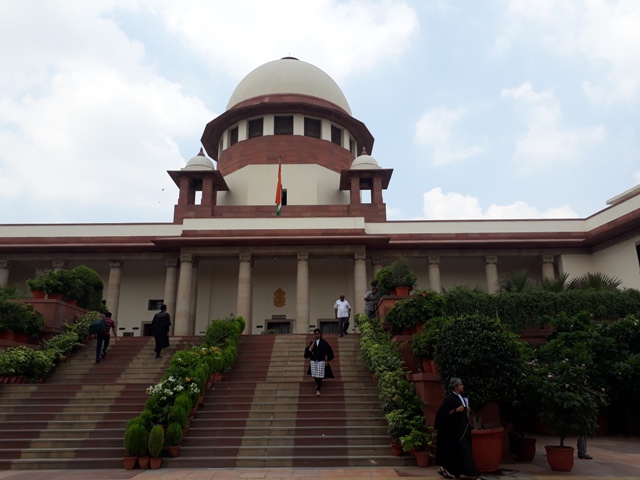SC allows NGO to file appeal against HC order upholding Asthana's appointment as Delhi CP

- Country:
- India
The Supreme Court Thursday allowed an NGO to file an appeal against the Delhi High Court order which upheld the Centre’s decision to appoint senior IPS officer Rakesh Asthana as Delhi Police Commissioner four days before his superannuation on July 31.
A bench of Justices D Y Chandrachud and A S Bopanna said that it will take up for hearing the writ petition filed by the NGO and the appeal to be filed by it on November 26.
Advocate Prashant Bhushan, appearing for the NGO, 'Centre for Public Interest Litigation' (CPIL), said that the court had on August 25 kept its plea against Asthana's appointment pending and asked the Delhi High Court to decide expeditiously a similar plea pending there.
“Now that the high court has decided the plea pending there, this court has the benefit of the judgment. I request this court to decide our plea which is pending here challenging the appointment of Asthana,” Bhushan said.
Solicitor General Tushar Mehta, appearing for the Centre, raised a preliminary objection on the technical ground that it is a writ petition and if Bhushan is aggrieved by the order of the high court, then he has to file an appeal with the permission of this court.
The bench said there are precedents where, with the court’s permission, a party who is aggrieved with a high court order can file an appeal.
“We will grant you the liberty to file an appeal and would take both the writ petition and the appeal together and decide it because we only asked you by our order of August 25 to move the High Court by way of impeachment,” the bench said.
Senior advocate Mukul Rohatgi, appearing for Asthana, said the court should not keep the writ petition pending if it is granting liberty to the petitioner NGO to file an appeal. The bench said it would look into that aspect on November 26.
On October 12, the Delhi High Court upheld the Centre's decision to appoint Asthana as Delhi Police Commissioner four days before his superannuation on July 31, saying there was “no irregularity, illegality or infirmity” in his selection.
Dismissing a PIL challenging his selection, it had said the justification and reasons given by the Centre for appointing Asthana are plausible, calling for no interference in judicial review.
The high court had said the Supreme Court's decision in the Prakash Singh case, which mandated a minimum tenure for certain police officials and the constitution of a UPSC panel before selection, did not apply to the appointment of Police Commissioner for Delhi but were “intended to apply only to the appointment of a State DGP”.
Asthana, a 1984-batch IPS officer, who was serving as the Director-General of Border Security Force, was appointed the Commissioner on July 27 after being shifted to the Union Territory cadre from Gujarat cadre for the tenure of one year.
On August 25, the top court had asked the Delhi High Court to decide “preferably within two weeks” the plea pending before it challenging the appointment of Asthana as Delhi Police Commissioner.
It had permitted the NGO to move the high court to intervene in the pending plea against Asthana's appointment.
The NGO's petition has urged the top court to set aside the Centre's order to appoint Asthana after extending his service period.
At the outset, the CJI had then expressed his inability to hear the PIL saying, “I had expressed my views during the selection of CBI director”.
The CJI in an earlier meeting of the high-powered selection panel, which also comprised the Prime Minister and the leader of the opposition, had put forth the legal position which reportedly led to non-consideration of Asthana for being appointed as the CBI Director.
The NGO has urged the apex court to direct the central government to produce its July 27 order approving the inter-cadre deputation of Asthana from Gujarat cadre to AGMUT cadre.
It termed the extension of his tenure as well as an appointment as “illegal” as he did not have a residual tenure of mandatory six months of service at the time of his appointment as Commissioner of Police since he was to retire within 4 days.
It also claimed that the order violated the “Fundamental Rule 56(d)” which stipulates that ‘no government servant shall be granted extension in service beyond the age of retirement of sixty years.’ “The central government did not have the power under ‘Rule 3 of All India Services (Conditions of Service- Residuary Matters) Rules’, to relax Rule 16(1) of the All India Services (Death-Cum-Retirement Benefits) Rules, to give an extension of service to Rakesh Asthana,” the PIL claimed.
The CPIL has further claimed that the Centre’s order violated the policy regarding Inter-Cadre deputation of All India Service Officers.
(This story has not been edited by Devdiscourse staff and is auto-generated from a syndicated feed.)
- READ MORE ON:
- D Y Chandrachud
- A S Bopanna
- Death-Cum-Retirement Benefits)
- Gujarat
- The Supreme Court
- Centre for Public Interest
- UPSC
- “Fundamental Rule 56(d)
- Delhi High Court
- Rakesh Asthana
- All India Services
- Tushar Mehta
- Border Security Force
- CPIL
- Rule 16(1
- Delhi
- State
- Rule 3 of All India Services (Conditions of Service-
- Inter-Cadre
- High Court
ALSO READ
CAA, related rules brought to safeguard rights of minorities from Pak, Afghanistan & B'desh, says fresh plea
Court reserves order on framing of charges in sexual harassment case against Brij Bhushan Singh
Trump ally Clark broke ethics rule in election subversion attempts, panel rules
Trump ally Clark broke ethics rule in election subversion attempts, panel rules
Trump ally Clark broke ethics rule in election subversion attempts, panel rules










